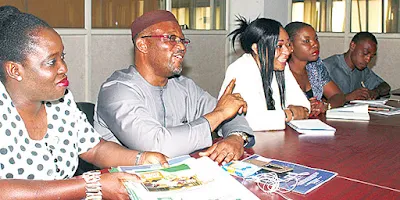The Nigerian media has been urged to rise up to their responsibility of pressuring the government to make adequate health budgetary allocations, especially in the area of child, women, otherwise family health.
This call was made by Mrs. Chioma Kanu, an official of the Partnership for Advocacy in Child and Family Health (PACFaH) during a courtesy visit of the team to Newswatch Times, recently, who insisted that it is very important for the media to support civil society groups in ensuring that government fulfill it promises of adequate health care to the people particularly, for mothers and children.
Kanu explained that the essence of the team’s courtesy visit is to mobilize the media in the country to support the group and represent the society well.
According to her, there are a lot of malnourished children across the country and there is a need for civil society groups to mobilize resources for nutrition with the support of the media.
She observed that timely reports of event as it relate to nutrition and giving priority to nutrition by the media is very important.
“Editorial dedicated to children and family and capacity building of Civil Society of Nigeria are the key areas that the media can help,”Kanu said.
Dr. Ejike Orji, Chairman of Advocacy for Family Planning in Nigeria who is also a member of PACFaH lamented that the rate of family planning support is 10 per cent for over 20 to 30 years and there is a need for the media to convince the government to make adequate budget for it.
Orji noted further that meager money released by government does not even get to the right source.
His words: “Money released doesn’t get to right recipient, 1.6 per cent goes to federal ministry of health in the budget,” he said.
An analysis of the 2016 budget shows loop holes which if not addressed before appropriation will impact negatively on the sector and the health of Nigerians, Orji noted.
Expressing PACFaH’s concern over the inadequacy of the 2016 budgetary proposal for the country’s health sector, the physician said, that the N257.3 billion being proposed for the Ministry of Health is inadequate to achieve the desired goal of ensuring the wellbeing of the citizenry.
“By this allocation and with an estimated population of 173.6 million, according to the World Bank, allocation to the healthcare sector by the federal government, on a per capita basis, amounts to N1,488.00 ($7.55, $1=N197). In 2015, with a total allocation of N259.75 billion and an estimated population of 168 million, allocation on per capita basis was N1,546.00.
In 2014, allocation was N264.46 billion, an estimated of 160million, allocation on per capita basis was N1, 653.00.00,” Orji said.
Eight days to the New Year, President Muhammadu Buhari , presented this year’s proposed budget estimate of N6.08 trillion to a joint session of the National Assembly. Out of the estimate, N257.3 billion was proposed for the Ministry of Health.
This represents 4.23 per cent of the budget, lower than that of 2015 (5.78 per cent). Although the capital expenditure budget is 13.86 per cent which is more than 8.73 per cent of the 2015 budget, the health budget’s value for this year also ranks the fifth largest allocation.
The proposed budget is now awaiting deliberation and approval by the National Assembly, and thereafter presidential assent. Analysts have however said that the proposed health budget is not only inadequate, but is also a far cry from the 15 per cent “Abuja declaration.”
In April 2001, heads of state of African Union (AU) countries met in Abuja and pledged to prioritize the development of the health sector by allocating at least 15 per cent of their annual budgets to improve the sector.
In spite of this commitment, a preview of the trends of budgetary allocations over the years shows that the federal government has been allocating between five per cent and six per cent of the budget to health, and it has never exceeded that at any point in time while Rwanda, Swaziland, Ethiopia, Malawi, the Central African Republic and Togo have since kept to the promise of the Abuja declaration.
Keeping the “Abuja Declaration” promise will increase the amount of resources spent on health and if spent efficiently, could improve access to quality health services and save lives.
The team urged the media to engage the government to generate fund to sponsor immunization vaccine for children and encourage family planning in other to help reduce child and maternal mortality rate in the country.
PACFaH is a social accountability project implemented through the strategy of partnership building of indigenous NGOs champions and activities to catalyze government at national and state levels in Nigeria to fulfill their commitment to child and family health.
This story was published in Newswatch Times on February 6, 2016.




